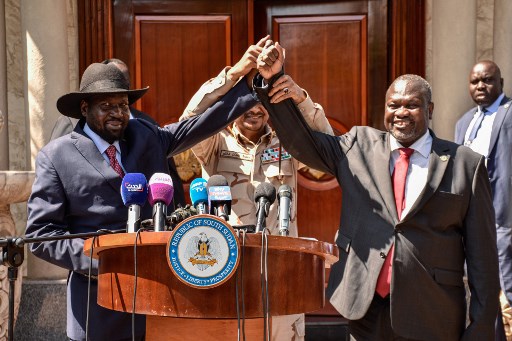
South Sudan’s president and its armed opposition leader agreed Tuesday to form a power-sharing government by a February deadline, as they face international censure over faltering peace talks.
President Salva Kiir and his former deputy, Riek Machar, signed a truce in September 2018 but failed to respect a cornerstone of that agreement — that they form a unity government and lay their differences to rest.
Two deadlines have passed without Kiir and Machar, a former rebel leader who lives in exile, agreeing to join forces.
Disagreements linger over territorial boundaries and a commitment to unifying their fighters.
On November 12 they were given another 100 days to honor the pillar of the peace deal, and fears have grown that the country’s fragile truce could be at stake should they fail to do so once again.
Following talks in Juba, Kiir said the pair had agreed to meet the 100-day deadline.
“We… have said that after the 100 days we have to form the government”, Kiir said, adding that any outstanding negotiations would be worked through by the new administration.
Machar said the warring parties “were not able to move ahead” with squabbles over territory. The leaders have long disagreed over the number of states, who should control them, and where boundaries should lie.
But they had made some progress toward bringing their fighters under one umbrella — another key part of the peace deal that brokered the longest ceasefire in South Sudan’s brief history as a nation.
“At the end of the 100 days, there should be a joint security force. This is one thing we have agreed on,” Machar said.
South Sudan plunged into war in 2013, just two years after it achieved independence from Sudan to the north, after a falling-out between Kiir and Machar, who now lives in exile.
Successive peace deals and mediation bids have failed to achieve a lasting peace for the world’s youngest country.
But the 2018 agreement largely paused the bloodshed that left nearly 400,000 South Sudanese dead and forced roughly four million people — one-third of the population — from their homes.
Kiir and Machar’s failure to stick to the terms of the peace has angered the US, a key supporter of the country’s independence in 2011 from Sudan to the north.
The talks in Juba between the parties comes a day after Washington imposed sanctions on two sitting ministers in South Sudan, accusing them of obstructing the young country’s peace efforts.
